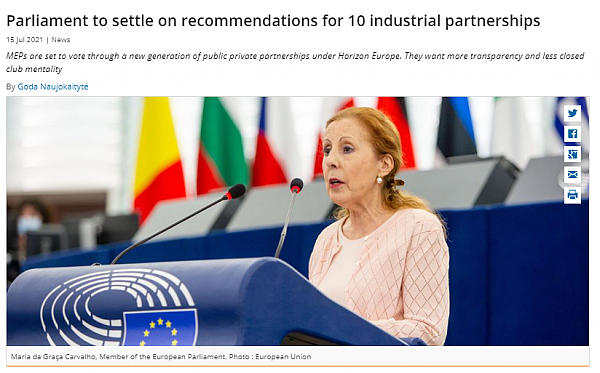Press Parliament to settle on recommendations for 10 industrial partnerships
The European Parliament wants the new generation of industrial Horizon Europe partnerships to be more open and transparent, its industry and research committee ITRE will state today.
“The calls for proposal and call for tenders must be open, transparent and inclusive throughout the whole implementation of the work plan of the partnerships,” Parliament rapporteur for the file, Maria da Graça Carvalho, told Science|Business.
In the past, the partnerships funded by the EU budget and matched industry contributions, have been accused of being closed door clubs for industry giants, subsidising private research at the taxpayers’ expense. They draft roadmaps for innovation in their sectors and fund projects that have an impact on the future direction of certain technologies.
MEPs hope the next generation of partnerships will be more inclusive to newcomers, smaller companies and have more balanced geographical participation, with members from all around Europe.
In support of this aim, Parliament introduced a set of amendments to the rules to make the partnerships more attractive to public sector organisations and smaller companies, such as special funding rates for SMEs and the option to finance public sector contributions with the help of regional funds or the EU COVID-19 recovery package. Technically, any company can join the partnerships today but they are not all on an equal footing.
Parliament doesn’t have legislative powers over the partnerships, but can make recommendations to the member states, which have the final say in what the partnerships will look like. The one exception is a partnership on metrology, where Parliament has a seat at the negotiating table.
There are two partnerships in drug development, one for Europe, the Innovation Health Initiative, and one for Africa, called Global Health. In the digital sector, partnerships will cover topics including smart networks and electronic components. To further the EU’s green goals, there will be partnerships for clean hydrogen fuels and a circular bio-based economy. In transport, the partnerships will support clean aviation, rail networks and air traffic control.
To support these industries, the Commission is ready to put €10 billion on the table, to be matched by comparable sums from industry. But the member states may cut or raise the EU contribution.
MEPs also agree on the importance of including more scientists in the advisory boards of the partnerships, increasing the visibility of their work around Europe, and synergies with other EU programmes, such as the regional funds and the European Investment Bank. “We ask the commission to create clear simple and concrete guidelines for how to apply these synergies,” said Carvalho.
ITRE members largely found consensus on what the partnerships should look like in terms of general objectives and budget, but differences remain in the way certain partnerships should function. The hydrogen partnership is a particularly sore issue, with some groups wanting to explicitly rule out support for hydrogen production from fossil fuel sources within the initiative.
Parliament is to hold the final vote on the report in the September plenary. Once Parliament has its say, the member states will be able to finalise the legislation, which they aim to do by the end of year, allowing the partnerships to launch without further delay.
For the metrology partnership, the final vote will open the doors to negotiations with the member states and the Commission. Carvalho says there are no fundamental differences between the positions of the three institutions and hopes one round of negotiations will be enough to reach an agreement.
Earlier this week, the member states gave the green light to the EuroHPC partnership creating a supercomputing ecosystem in Europe. Although the member states cut the budget by €1 billion, resulting in a total budget of €7 billion, Carvalho is happy with the final result. The deal paves the way for the other ten partnerships, she said. “But we hope that the Council takes into consideration some of our proposals after a very important expressive vote [today].”
